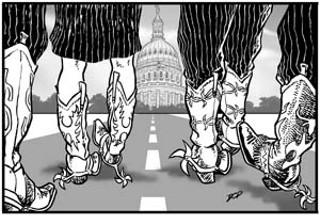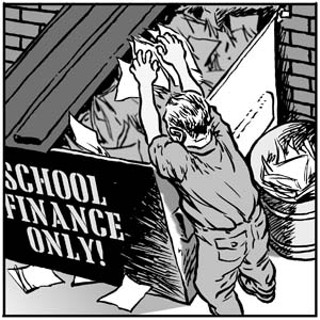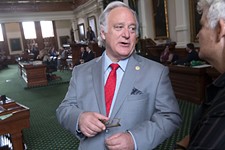From Schools to ... Nuts
The 79th Lege hasn't been here before – it only seems like it
Fri., Jan. 14, 2005

Capitol Chronicle
As the 79th Lege opens to a challenging beginning – nothing like starting off a session with the Dance of the Sore Losers – it's tempting simply to reiterate a column I wrote last spring, at the opening of the "special" session on public school finance. "Whatever else happens over the next 30 days ... Texans should expect an education. Not necessarily about public schools and their needs and resources, but about the nature of political power and its exercise in Texas. Like it or not, we're about to receive a high-speed seminar."
Not much has changed since May. Since a regular session has 140 days, the education will not be quite so accelerated, but the subject remains the same: Who holds political power in Texas and how is it exercised? Although the dominant interests remain roughly the same – energy, petrochemicals, insurance, pharmaceuticals, construction, agriculture, now burnished a little bit by high tech – the specific answer (beyond a reflexive "No New Taxes") tends to be a fluid one, depending on the issues confronting a given session. This week Gov. Perry made it official: The "emergency" subjects for this session will be Adult Protective Services, Child Protective Services, and "education legislation," the latter formulation carefully avoiding raising expectations too high for an increase in public school funding.
In his remarks accompanying the designation, Perry emphasized property tax cuts and education "reform" above additional funding, and incentive or "merit" pay above any across-the-board increase in teacher salaries. As it was in the spring, that will be the choreography of the continuing Republican two-step over public school finance; how can we increase the available funding for public schools (as demanded both by statewide demographics and the rising voices of our suburban constituents) yet maintain the risible level of taxation that we are committed to both ideologically and structurally?
One way to imagine the solution is to consider what's being done about much smaller yet more urgent situations, the crises in both adult and child protective services. As these essential safety-net services were allowed steadily to deteriorate, the inevitable headline tragedies to elderly and youthful clients finally exploded this year. Last week, coinciding with the release of the Health and Human Services review, Perry proposed $329 million in new funding to CPS that would bring monthly caseloads down into the 40s – a level, Scott McCown of the Center for Public Policy Priorities acerbically pointed out, almost twice as high as that when then Gov. George W. Bush declared the agency in "crisis." Let's suppose the Lege duly enacts the governor's proposal (or similar ones prefiled in both houses), and then adds a proportionate amount for APS. That should just about consume the $400 million in "surplus" funding that Comptroller Carole Keeton Strayhorn announced on Monday. Anything left over for the schools ... or teachers ... or children's health insurance ... or higher ed ... or environmental protection ... or even bigod prisons?
You get the idea – the session hasn't even begun, and the poor-mouthing is in full chorus. There does seem to be a working consensus, at least on the Senate side, for some kind of "broad-based business tax" to replace the proposed 25-33% cut in property taxes, but little such (audible) sentiment in the House, and virtually no enthusiasm anywhere to find a mix of taxes that will raise additional funding (that is, something approaching adequacy) for the public schools. One can expect, of course, that the gambling lobby is saddled up and ready to ride hard into the vacuum.
There is one new factor that may increase the pressure – the Judge John Dietz court decision that, pending the state's Supreme Court appeal, would require the Lege both to reduce (or replace) the dependence on local property taxes and to increase the sufficiency and equity of school funding. In recent weeks, one rumor making the rounds was that the Lege would find some way to solve the first part of the equation – moving the money around – and hope that the courts would wink at the second part – actually adding funding. Public school advocates say it just won't work. Asked about that possibility last week, the Equity Center's Wayne Pierce replied, "I'm always optimistic. ... But the idea that we can respond to the court's decision without providing new money for the schools is literally just burying your head in the sand."
Alas, it wouldn't be the first time that the Texas Legislature adopted the legendary posture of the ostrich in response to the state's real problems, and instead turned to regulating our private lives, our sexual habits, our amusements. On the following pages, our News staff takes an early look at the trends and preoccupations of the 79th Lege, as revealed by a sampling of the bills that hit the printer in the last few weeks. Consider this your introduction to the gathering circus. As the weeks go by, we'll be providing regular snapshots of the action under the Big Top.
– Michael King

Lawmakers will be called on to put their money where their mouths are in 2005, and to restore cuts made last session to the Children's Health Insurance Program, which cast 150,000 children out of the state's safety net. Even many conservatives concede that 2003 budget writers went too far in their determination to wipe out a $10 billion shortfall without (directly) raising taxes.
This year there's a lot of talk about restoring all or part of the cuts that many believe cost the health care budget ringleader, former state Rep. Arlene Wohlgemuth, R-Burleson, her chance of ousting U.S. Rep. Chet Edwards, D-Waco, who defeated her in spite of redistricting. Republicans say they are seeing the light. Lt. Gov. David Dewhurst said last week he'd like to see some of the dropped medical benefits, such as dental, vision, and hearing, restored to CHIP. Sen. Jane Nelson, R-Lewisville, is taking the lead on prioritizing the funding needs of the needy in her visible role as chair of the Senate Committee on Health and Human Services. GOP Sen. Kip Averitt of Waco was one of the first to file legislation to reverse the CHIP-slashing of the previous session.
But talk is cheap when weighed against a legislative agenda full of sticky-wicket issues to tackle this session, with the school finance conundrum topping the list. Moreover, Comptroller Carole Keeton Strayhorn's budget estimate gives legislators $400 million to work with this session and, in the larger scheme of the state's overall health care crisis, even with the best intentions that's not enough to cure everything. Besides CHIP, there are other nagging questions: What to do about funding the ever-expanding Medicaid rolls? How to make health insurance more affordable for teachers and employees in the private sector? How far to take a much-needed overhaul of the state's workers compensation system? And how long will Texas continue to have one of the worst health care records in the nation?
At the moment, the most popular method for restoring CHIP cuts is to raise the cigarette tax. State Reps. Elliott Naishtat, D-Austin, and Carlos Uresti, D-San Antonio, have each filed bills that would do just that. Naishtat wants to increase the tax by a buck a pack. (Unfortunately, the cigarette tax has been earmarked for virtually every new expense, including public school finance – it won't stretch that far.)
In the short term, chances are looking favorable for a CHIP fix. But will this bipartisan soft-heartedness hold firm for the long term? We'll get back to you on that.
– Amy Smith
Higher Ed: When Is Action Not Affirmative?
Take one UT-Austin president (Larry Faulkner) who complains that the law guaranteeing automatic admission to high schoolers who graduate in the top 10% of their class hamstrings the admissions process. Add the many Texans who dislike the top 10% plan because it reminds them of what it was designed to replace, nasty old affirmative action – and not incidentally, because many suburban white Texas kids were long accustomed to coasting into Austin on Ladies and Gentlemen's B's.
The result is something like HB 37, a bill by Sen. Rob Eissler, R-The Woodlands, that would revise the law to guarantee admission to a UT school, but not necessarily the flagship. Since most 10 percenters don't need any help being accepted to, say, UT-El Paso, HB 37 is basically an evisceration. While a Supreme Court ruling enabled UT to again consider race in admissions, making the 10% plan less important in ensuring racial diversity, those who argue that the law also helped increase geographic and economic diversity will likely come to its defense.
– Rachel Proctor May
Campaign Finance Tug-of-War
The campaign finance debate could reach new highs (or lows) this session as legislators consider whether existing laws banning corporate and union money in politics should be strengthened or diluted. Reps. Craig Eiland, D-Galveston, and Todd Smith, R-Euless, are expected to file legislation that would broaden a similar bill filed by Austin Democratic Rep. Elliott Naishtat. Naishtat's HB 72 would ban so-called "issue ads" – nominally "educational" ads that are in fact stealthily partisan. The Eiland/Smith proposal would also tighten the existing prohibition on corporate money in political campaigns, and clarify what, exactly, qualifies as a corporate or union "administrative expense" on financial reports that they're required to file with the Texas Ethics Commission. The latter also seeks to shed more light on organizations' spending habits during political cycles.
On the other hand, the state GOP's favorite attorney, Andy Taylor, is expected to lobby for legislation that would legalize corporate campaign contributions. Corporate money in politics has assumed new dimensions since the last session, which coincided with Travis Co. District Attorney Ronnie Earle's initiating an investigation into political action committees run by the Texas Association of Business (represented by Taylor) and Texans for a Republican Majority. Both groups relied heavily on corporate dollars to finance ad campaigns that helped produce a GOP House majority. The criminal probe continues, and has thus far produced indictments against three associates of TRMPAC founder U.S. House Majority Leader Tom DeLay. House Speaker Tom Craddick, also a focus of Earle's investigation, could find himself in an uncomfortable position if and when this particular issue hits the floor.
Fred Lewis, who heads the reform advocacy group Campaigns for People, said the bills, despite their dry language on paper, could make for an interesting session. "We're going to have a very serious discussion about these issues," he said. "This is going to be a very important fight, and I believe we will have a good chance of prevailing."
– Amy Smith
Don't Ask, Don't Tell ... Just Don't
We've come to expect the biannual filing of gay-bashing bills, and with clockwork predictability, right-wing GOP Reps. Warren Chisum of Pampa and Robert Talton of Pasadena have already cast the first set of stones. The two lawmakers have filed separate bills that seek a state constitutional amendment to ban gay marriage in Texas. Chisum's House Joint Resolution 6 was the first bill out of the gate, but Talton one-upped his colleague with legislation that would prohibit not only marriage but civil unions between same-sex couples (HJR 10). The Lesbian/Gay Rights Lobby of Texas also expects to see legislative attempts to deny gay/lesbian/bisexual/transgender individuals the right to adopt or serve as foster parents. Talton filed a similar bill in 2003, but not even his fellow conservatives on the State Affairs Committee could bring themselves to vote on the measure in the face of large-scale opposition, not to mention the devastating impact the bill would have on the state's foster care system.
Meanwhile, the national spotlight is on Texas as gay rights activists from all over head to Texas this weekend to map out opposition strategies to the right wing's "homosexual agenda." Leaders of the National Gay and Lesbian Task Force will be in Austin for an old-fashioned Power Summit that takes place Jan. 15-17. The national leaders will provide gay rights activists from Texas and other states some essential campaign guidelines for defeating anti-gay constitutional amendments in Texas and elsewhere.
Notwithstanding the hard-right faction, the gay rights lobby can now call on a fair number of allies in the House and Senate to lead the fight against any gay-bashing bills that reach the floor. As she did in the 2003 session, Rep. Jessica Farrar, D-Houston, has again filed a bill (HB 143) that would prohibit employment discrimination based on sexual orientation or gender identity.
– Amy Smith

Return of the Voucher Vampires
As if school finance, part IV, weren't enough, dozens of more specific education bills have already been prefiled, touching on everything from discipline for bullies to restoring last session's cuts to teacher health insurance. The Texas Education Agency is also up for its 10-year reauthorization, also known as a "sunset" review – sometimes the scene of useful reforms, but inevitably an occasion for much legislative posturing. The heavy dose of ed policy bills suggests some major fights are in the works – either as a supplement to, or a means of distraction from, serious school finance reform.
Clink ... clink ... clink. Hear that? That's the sound of shiny silver spurs striding toward Main Street for the great voucher showdown of 2005. One of the session's earliest prefiled bills was HB 12, by San Antonio Republican Rep. Frank Corte. This is the now perennial "pilot" voucher bill, designed to pay private school tuition for kids in "failing" schools in Texas' six largest school districts – thereby removing that income (but not the fixed district expenses) for the kids who remain.
Past voucher bills, despite reflexive support from the Republican leadership, have met death on the Capitol floor, largely because of strong Democratic opposition joined by rural Republicans who see nothing in the bill for their constituents. But should HB 12 meet the same fate, Corte says, he's ready to attach voucher legislation to one (or more) of the many other education bills: raises and health insurance for teachers, school finance, even TEA reauthorization. Voucher opponents, such as teachers' organizations and the Coalition for Public Schools, say they're ready to oppose any bill that includes vouchers.
– Rachel Proctor May
Drug Warriors and Cowboys
At press time, no less than 10 filed bills relate to possessing, cooking, or trafficking in methamphetamine, from a bipartisan brace of legislators: Sen. Jane Nelson, R-Lewisville; Sen. Craig Estes, R-Wichita Falls; Democratic Sen. Leticia Van de Putte, D-San Antonio; and Rep. Leo Berman, R-Tyler. Yet even should they become law, the measures are likely doomed to fail. In a replay of unlearned lessons past, the legislative meth-hunters attack the speed problem almost exclusively through enhanced criminal punishments, including a new scheme of mandatory minimums. For example, Estes, Van de Putte, and Berman all propose that possession of less than one gram (about one twenty-eighth of an ounce) of meth be raised to a third-degree felony, or a second-degree felony if a child is exposed to the manufacture or use. Similarly, possession of between 1 and 4 grams would be raised to a first-degree felony, or a man-min incarceration of 10 years if a child is exposed – and so on and so on. In short, the bills would mean more costly prison-clogging, but fail to propose any targeted treatment for addicts.
By contrast, Rep. Harold Dutton, D-Houston, is once again seeking to decriminalize possession of small amounts of marijuana, and to lessen the punishment for possession of larger amounts. Under Dutton's HB 254, possession of up to 1 oz. of pot would be punishable only by a maximum $500 fine; possession of between 1 and 2 ozs. would be downgraded to a Class B misdemeanor, possession of between 2 and 4 ozs. a Class A misdemeanor offense. Although the bill's ultimate prospects are slim, the House Criminal Jurisprudence Committee is likely to keep it active long enough to secure another hearing with former Dallas Cowboy Mark Stepnoski, president of Texas NORML, who testified before a rapt dais in 2003.
– Jordan Smith
Apothecary Rights
Thus far there's no sign of the Right's favorite "Life-Begins-When-We-Say-So" bill, but that doesn't mean the Lege's Personal-Friends-of-God are slacking. Indeed, Rep. Frank "The Fetus" Corte, R-San Antonio, has already begun his biennial assault on reproductive freedom, this time under guise of defending the moral rectitude of pharmacists. That's right, in the battle between women's right to health care and pill dispensers, Corte is putting his legislative power behind moralistic drug salesmen. Under HB 16, Corte proposes allowing pharmacists to refuse to fill prescriptions for so-called "emergency contraceptives" – which he defines as all pharmaceutical birth control pills. And while proposing that discrimination or retaliation against a self-righteous pharmacist – that is, requiring them to do their jobs – will not be tolerated, Corte offers no alternative mechanism for prescription-holders who are turned away.
Meanwhile, Houston Democrat Rep. Jessica Farrar has filed two offerings that would revise the Corte-authored "Informed Consent" statute passed last season, which requires women to review state-printed abortion-related propaganda before terminating a pregnancy. Farrar's bills, HB 145 and HB 146, seek to exempt rape victims and women who have a "severe and irreversible abnormality" in a fetus from the required reading and 24-hour waiting period (during which, presumably, they could while away the time by shopping for a handgun – no delay required).
– Jordan Smith
Tried to Death
Capital punishment has already earned several honorable filings – but even with the U.S. Supreme Court currently taking a dim view of Texas death penalty practice, Texans shouldn't hold their breath in anticipation of dramatic changes. Sen. Eddie Lucio, D-Brownsville, and Rep. Ruth Jones McClendon, D-San Antonio, have each filed life-without-parole bills (SB 60 and HB 66) – perennial teeth-gnashers for prosecutors, who speciously argue that a third capital-sentencing option would end in terminal confusion for presumably stone-cold stupid jurors. What they really fear, of course, is that a no-parole option would lessen their ability to secure a death sentence. McClendon has also proposed a ban on executing juvenile offenders, a bill that may very well be rendered moot by the U.S. Supreme Court's opinion in a pending Missouri juvie death case (a decision in Roper v. Missouri is expected soon).
Although the Supremes banned execution of the mentally retarded in 2002, Texas lawmakers are still arguing over how to incorporate that ban into the state's capital statute. As usual, there are two competing proposals – pre- and post-trial systems. Sen. Rodney Ellis, D-Houston, is again proposing that a determination of a defendant's mental retardation be made during a pretrial special hearing with an individual jury. In the other corner is Palestine Republican Sen. Todd Staples, who would prefer to add a fourth "special question" to the list jurors now ponder during the sentencing portion of a capital trial. The cumulative answer determines whether a defendant is sentenced to death; an affirmative finding of mental retardation – by a preponderance of the evidence – would prevent a death sentence, but jurors would not be bound to accept a past finding of mental retardation as grounds for answering "yes" to that question.
– Jordan Smith

Smoke Gets in Your Skies
Although few bills have yet been prefiled, several big environmental issues that pit decidedly non-fleece-wearing folks against powerful business interests are percolating. Water is a perennial statewide issue, and growing more contentious by the session. As growing commercial demand for water has run roughshod over the state's antiquated water laws, West Texans are hoping for more clarity over their rights in relation to those of private companies to pump out and sell groundwater.
Closer to home is the issue of rock-crushing operations. Underneath those glorious mesquite-stubbled Hill Country landscapes, increasingly dotted with high-end estates and subdivisions, are tons of quality limestone. Dug up and crushed into aggregate, limestone is a key ingredient in the miles and miles of roads required for Hill Country development – but the processing pollutes the air and water (including the Edwards Aquifer), makes lots of noise, and looks ugly to boot. Residents of swanky places like Ruby Ranch in Hays County have begun to sound like veritable Erin Brockoviches of the Lexus set; they're demanding a greater voice in permit-granting decisions, and even (gasp!) more government regulation. Cyrus Reed of the Texas Center for Policy Studies describes Sens. Troy Fraser, R-Marble Falls, and Craig Estes, R-Wichita Falls – neither of whom exactly hang with the Sierra Club – as probable allies. (Both senators' offices said they were still studying the issue.) Will the well-off link arms with Texans for whom the neighborhood polluter is not a quarry but a benzene-spewing refinery?
Probably not. But someday it may no longer pay to pollute in Texas. In 2003, the state auditor confirmed that the fines the Texas Commission on Environmental Quality levies against polluters is dwarfed by the amount of money the polluters can make by ignoring the laws. The TCEQ is undertaking yet another internal review – environmentalists hope for a bill to force them in the right direction.
Meanwhile, industry will no doubt continue pushing for less regulation and enforcement, for example by limiting the rights of citizens to hold TCEQ "contested case hearings" that challenge polluters' practices or new sources of pollution. An effort to weaken the contested case hearing legislation failed last session; Mary Kelly of Environmental Defense says she's hoping for a replay. "Hopefully we'll just battle each other to a draw," she said, "and then TCEQ will move on its own."
– Rachel Proctor May
Bill Watch: A Very Brief Selection
The Good
SB 37 (Zaffirini): Would grant victims of sexual assault the right to receive a forensic rape exam, if the alleged assault is reported to law enforcement within 96 hours.
SB 63 (Staples): Would provide a $200/month raise to every state employee. It's a start.
HB 23 (Brown): Expect the status quo to prevail over Fred Brown's bill, which would prohibit the dubious use of credit-scoring in underwriting.
HB 24 (Thompson): Would raise the monthly personal needs allowance of nursing home Medicaid patients from $45 to $75, undoing some of the damage of 2003.
HB 52 (Hopson): Would restore the $1,000 health care stipend to teachers, slashed more than half by the 2003 session.
HB 171 (Dukes): Would install straightforward caseload limits for Child Protective Services caseworkers, moving downward toward 18 per month (still above federal standards).
The Bad
HB 17 (Corte): In latest wrinkle in "parental consent" to abortions, Corte proposes collecting "statistical information" on judicial bypasses to consent – with the transparent intent to dodge or intimidate judges deemed soft on consent.
HB 220 (Howard): Would allow the State Board of Education to reject textbooks not only for "factual errors" – the Lege's feeble attempt to block the board's worst ideological excesses – but for "errors of commission or omission related to viewpoint discrimination or special interest advocacy." The change would give SBOE members even more leeway to commit and omit to their hearts' content.
HB 65 (McClendon): Would authorize large municipalities to create and enforce random Drug Free Zones around any geographical area, presumably targeting "drug-infested" areas; threatened enforcement includes the possibility of banishment from a DFZ neighborhood.
HJR 12 (Branch): Dallas Rep. Dan Branch is still mad about the Democrats' anti-re-redistricting quorum break – this is an attempt to amend the Constitution to limit quorum counts to legislators who are in the state. Strict constructionists, anyone?
The Goofy
HB 54 (Branch): The feel-good proposal of 2005, requiring a record vote on all final actions – a children's crusade joined this year by the state's major dailies. This seemingly unobjectionable "good-government" notion will slow the process, indirectly bury some good bills, and otherwise accomplish little.
HB 55 (Grusendorf); HB 109 (Wong): Grusendorf's bill would designate a segment of I-20 the "Ronald Reagan Memorial Highway"; Wong's even goofier bill would name the Capitol roundabout the "Ronald Reagan Circle" – why not just "Road to Nowhere"?
HB 93 (Riddle): The death certificate of an executed inmate currently lists the cause of death as "homicide" (that is, death by human action); this rhetorical precision outrages capital punishment supporters, who want it changed to "judicial execution."
HB 137 (Paxton): Would allow TxDOT to erect "Welcome to Texas" signs and include the phrase "Drive Friendly" and "Proud to be Home of President George W. Bush." Also known as "the Brown-Noser's Bill."
Got something to say on the subject? Send a letter to the editor.








